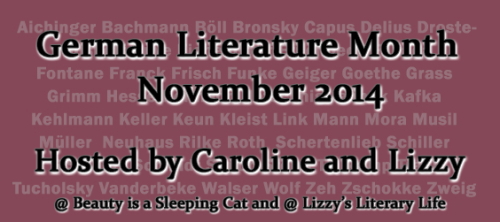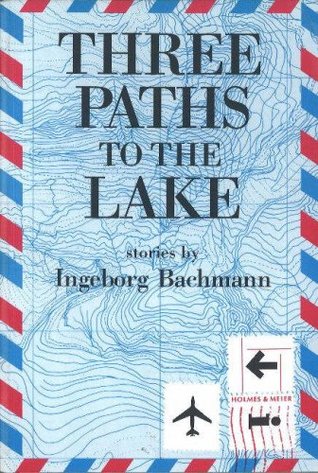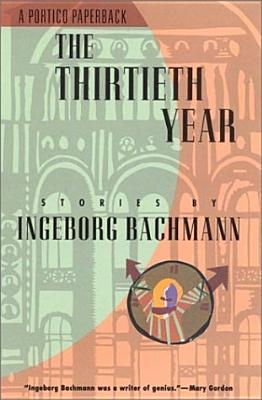Ingeborg Bachmann is one of my favourite authors, though I have read just one of her books – the short story collection ‘The Thirtieth Year’. This year, for German Literature Month, I was hoping to read atleast one of her books. So, I started reading her second short story collection, ‘Three Paths to the Lake’. This book has four short stories and a novella, which is the title story. I finished reading the novella yesterday. This post is about that novella. I will post about the other short stories separately.
‘Three Paths to the Lake’ is a novella of around a hundred pages and occupies around half of the book. It is about Elisabeth, a fifty year young woman. Elisabeth is single, she is Austrian, is a journalist and works in Paris. She is seeing a younger man who is twenty two years her junior. Her father lives in a small Austrian town called Klagenfurt. Her brother is recently married and lives with his wife in London. After attending her brother’s wedding in London, Elisabeth comes home to visit her father. She spends a week with him. During that time, she tries to live the country life which she lived during her childhood, goes on treks in trails which lead to the lake, reads the newspaper with her father and occasionally meets old neighbours. During her time there, she also looks back on her life, her relationships with her father and with her brother Robert and with the other men in her life – some of whom were friends, others who were lovers, who left her and broke her heart, and one of whom she married, but who was gay and who was more a friend than a husband. At the end of the week, she goes back home to Paris, and she and her latest boyfriend decide to breakup with each other (she is calm about it while he is upset because she is not upset), and it seems that her life will take a new direction the next day and the story ends with that.
Like any other Ingeborg Bachmann story, ‘Three Paths of the Lake’ is not about the plot. Though it has an interesting plot with events from the current time and the past intricately and masterfully blended together. ‘Three Paths to the Lake’ is more a commentary on life, on the relationships between parents and children, on the relationships between siblings, on the relationships between lovers and partners, on love and how elusive it is, on the complex relationships between men and women, on how our deepest beliefs can come unravelled when we stare truth on its face, on how we forge our identities and how we belong to a place, on how things change every moment and every day and every year, on how it is impossible to travel back to the past as everyone and everything has changed – the story is about this and other things. It is a beautiful meditation on life. Many times I felt that it might have been Ingeborg Bachmann’s own memoir, with the names changed and some of the events probably fictionalized for our benefit. But like in any great piece of literature, the main characters look like us. They could have been any of us. Or someone we knew.
The description of Elisabeth’s father at the beginning of the book reminded me of my own father. It went like this.
…there was nothing, absolutely nothing Herr Matrei needed, and in this respect he made things difficult for his children. It wasn’t just something he said, it was actually the truth : you couldn’t give him Dunhill pipes, gold lighters, expensive cigars, ties, extravagant gifts from extravagant stores, or useful things, either; he refused to accept anything, took good care of all he had, from pruning shears and shovel to the few household appliances an old man needed. He didn’t drink alcohol, he didn’t smoke, he didn’t need any suits, silk scarves, cashmere sweaters, or aftershave lotions and even Elisabeth, who over the years had developed an inimitable imaginativeness in finding the right gift for each and every kind of man, didn’t have a clue when it came to her father. His lack of needs wasn’t a quirk, it was congenital, and he would hold fast to it until his dying day.
When one of Elisabeth’s colleagues dies while trying to report from a war zone and she is having a conversation on it with her lover (her favourite of all her lovers) Trotta, he says this – one of my favourite passages from the book :
“The war you photograph for other people’s breakfasts hasn’t spared you either in the end. I don’t know, but I’m unable to shed a single tear over your friends. If someone jumps into the middle of crossfire to get a few good shots of other people dying, then getting killed is nothing special, considering the sportsmanlike ambition it involves, it’s merely an occupational hazard, nothing more.”
A pretty hard-hitting passage and one which is extremely difficult to disagree with.
My most favourite passage in the book though was this. It is about the relationship between women and men.
There was only one hope she didn’t and wouldn’t allow herself to hold on to : that if, in almost thirty years, she hadn’t found a man, not a single one, who was exclusively significant for her, who had become inevitable to her, someone who was strong and brought her the mystery she had been waiting for, not a single one who was really a man and not an eccentric, a weakling or one of the needy the world was full of – then the man simply didn’t exist, and as long as this New Man did not exist, one could only be friendly and kind to one another, for a while. There was nothing more to make of it, and it would be best if women and men kept their distance and had nothing to do with each other until both had found their way out of the tangle and confusion, the discrepancy inherent in all relationships. Perhaps one day something else might come along but only then, and it would be strong and mysterious and have real greatness, something to which each could once again submit.
Yes, if we are not able to find the person of our dreams, it is better to just be friendly and as Voltaire says in ‘Candide’, live a simple life and tend to our own garden. That is not a bad life – it is simple and beautiful and rewarding.
When I read Ingeborg Bachmann’s other short story collection ‘The Thirtieth Year’, I found it philosophical and intellectually demanding. I was thinking that ‘Three Paths to the Lake’ would be similar. But it wasn’t. It was definitely philosophical. But it was more accessible. (It is either that or I must have become a more sophisticated reader in the short space of a year). Bachmann’s prose flows beautifully and though there are long sentences with multiple clauses, while reading them, one doesn’t notice their length or complexity. Bachmann makes reading a difficult book seem quite easy with her brilliant prose style. I don’t know how she managed to achieve that.
With every story I read, Ingeborg Bachmann keeps getting better and better. I think ‘Three Paths to the Lake’ is my favourite Ingeborg Bachmann story yet. I loved it. I will be definitely reading it again. I am looking forward to reading the other stories in the book. And if I have time left still, I hope to read her novel ‘Malina’.
Ingeborg Bachmann
I can’t finish this post without saying this. One of my perennial regrets will always be that dear Inge left behind only a small body of work – two slim short story collections, one novel, two novel fragments, one collection of poetry, one slim war diary and one collection of letters. I wish she had written more. I wish she had lived longer. But I am grateful that she wrote what she did and left behind these beautiful, slim, literary masterpieces. My life would have been poorer without them.
Have you read ‘Three Paths to the Lake’? What do you think about it?





